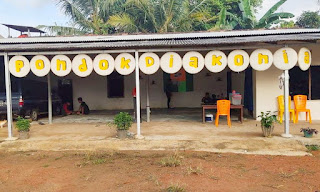The majority of the people of East Lampung Regency are an agrarian society, and they are connected by various kinds of global changes, especially in technology and information. For this reason, on December 15, 2021, at Wisma Centrum, the Multiplicator of Stube HEMAT in Lampung held a training with a theme: 'Effectively Manage Websites'. The training facilitated church youth, students, and university students to know what a website is, know the regulation when using social media, and at the end, each participant is expected to be able to manage social media wisely.
'Your finger is your tiger' is a wise expression conveyed by Basuki, S.Pd, M.Pd., the 1st deputy chairman of the Metro City house of representatives, one of the training facilitators. He described that nowadays, only with one finger someone can do good and bad deeds. Basuki, as an education practitioner, invited participants to be wise in using social media, because Indonesian currently use social media in communication and socialization activities, approximately 59% of them. YouTube is the most popular platform to access with 88%, WhatsApp at 84%, Facebook at 82%, Instagram at 72%, Twitter at 56%, and Line at 50% respectively.
Based on these data, it can be said that social media is like rice, the basic need for Indonesians. But, on the other hand, social media is a virtual world that is full of traps, because not every piece of information on social media is valid facts, data, or news. The Indonesian government implemented the Electronic Information and Transaction Law (UU ITE) to solve the problem and ensnare social media users who spread false news, hate speech, provocations, and other modes of deception that can harm others.
Departing from the point above, facing the world of modern technology and information requires an analytical and critical attitude to anticipate the bad side effects. The next facilitator, Dwi Setyo Harjanto, a program developer and technology criticist who developed critical discourses on the development of the Southern Sumatran Christian Church Synod (GKSBS) and Yabima Indonesia through the website. Websites are an important part of the development of news and communication media for human life in the context of spirituality and religion. Through a website, GKSBS and Yabima Synod offer various facilities of comfort, convenience, and fluency in interaction and information as a new spirituality as a means of communication from many aspects of life among diversities.
Through the training, the participants learned several things including how to use social media to build revolutionary philosophies, concepts, visions, and future scenarios that are expected to be a balance between the material and spiritual world, physical and spiritual, and reality and fantasy. It is a challenging task, but through the gates of the world of social media, humans have a chance to meet millions of people and travel around to see representations of texts, images, holy places, houses of worship, and artworks that can increase knowledge, consciousness, spirituality, and religion. Hopefully, God's goodness can be realized through social media. (YYD) ***






















































